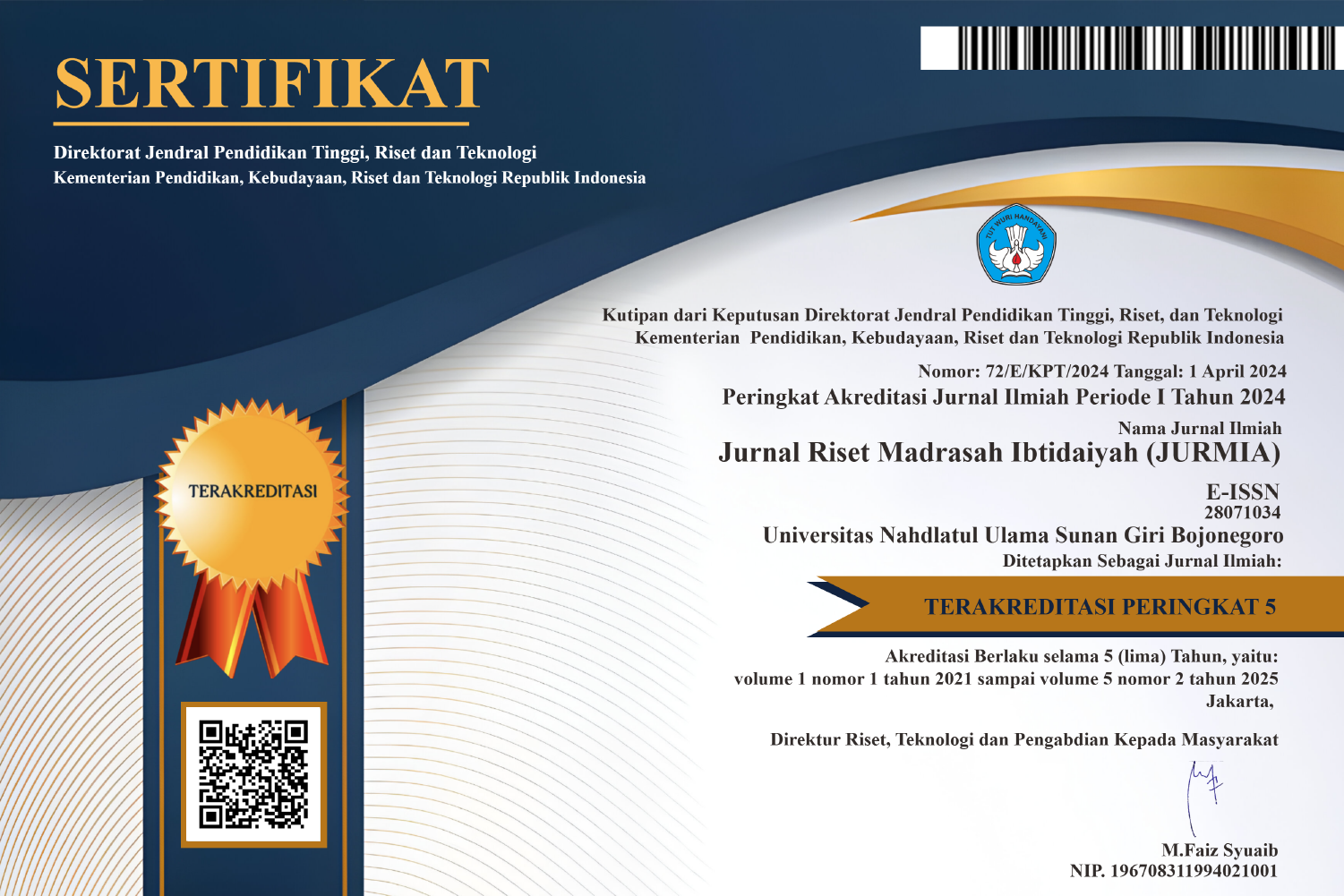Drug Abuse Among Elementary School Children: a Narrative Review of Implications For Islamic Ways of Prevention

DOI:
https://doi.org/10.32665/jurmia.v4i2.3267Keywords:
Bain, Children, Drug abuse, HIV, Islam, ParentsAbstract
Elementary education is the key to further education. Drug abuse is a troubling issue in most societies, involving the misuse of drugs, such as using them without a prescription or just to cause intoxication. The aim of this study is to review the implications of drug abuse from the perspective of Islamic prevention methods. The study uses a qualitative method with a narrative review technique. The findings show that drug abuse has many negative impacts on both users and passive members of society. Muslim communities are also not spared from the grip of drug abuse, necessitating a religious-based intervention. Although education at the elementary level and beyond offers significant benefits, drug abuse poses an obstacle to achieving educational goals for children. Due to their vulnerabilities and lack of experience, children often fall into drug abuse. Drugs are substances that can alter bodily conditions. Children may be drawn into drug abuse due to various factors, such as peer pressure, lack of experience, genetics, environment, and others. Drug abuse can affect physical health, cause mental health problems, disrupt education, and create numerous social issues. Parents who adhere to Islamic laws in parenting can significantly reduce drug abuse among children. Following Islamic laws, such as the prohibition of drugs, will certainly address drug abuse among children in society.
References
Abdullahi, I.A. (2018). Drug abuse and its effects to the Muslim society. International Journal of Social and Humanities Research, 6(3),77-85.
Abikwi M.I. & Okafor, C. (2022). Effect of drug abuse on the academic performance of undergraduate students in Edo state. International Journal of Scientific and Engineering Research,13(4),662-674.
Adilham (2023). The role of parents in shaping a child's personality in Islam. International Journal of Education, Vocational, and Social Science, 2(3),229-241.
Ahmad, S., Noor, M., & Saleem, A. (2022). Integrating Islamic Teachings with Conventional Drug Prevention Programs: A Community-Based Approach. Journal of Islamic Studies and Society, 15(2), 101-115.
Akanbi, M.I., Godwin, A., Anyio, B.T., Muhammad, M., & Ajiboye, S.A. (2015). Impact of substance abuse on academic performance among adolescent students of colleges of education in Kwara State, Nigeria.
Al-Ghamdi, F. (2022). The Role of Sharia in Preventing Drug Abuse: An Islamic Perspective. Journal of Islamic Law and Ethics, 7(1), 45-60.
Al-Hadad, R. (2022). Islamic Education as a Tool for Drug Abuse Prevention Among Youth. International Journal of Islamic Pedagogy, 4(3), 30-42.
Al-Tamimi, M. (2023). Addressing Drug Abuse in Muslim Communities: An Islamic Framework. Muslim Health Journal, 12(1), 75-89.
Anero, N.(2014). Relevance and challenges of primary education to the overall development of the child and the Nigerian society. Global Journal of Educational Research, 13,44-62.
Aziz, N.(2023). Parents-children communication: Islamic approach. International Journal of Social Science and Education Research Studies, 3(8),1671-1675.
Bensaid, B., Machoche, S.B.T., & Tekke, M. (2021). An Islamic spiritual alternative to addiction treatment and recovery. Al-jamiah: Journal of Islamic Studies, 59(1),127-162.
Brown, T., & Greene, H. (2023). The Impact of Early Drug Exposure on Children's Development. Journal of Child Psychology and Psychiatry, 64(3), 301-315.
Carter, P., Smith, J., & Johnson, L. (2023). Drug Abuse in Elementary School Children: A Growing Concern. Journal of Public Health Research, 11(4), 211-225.
Dada, S., Burnhams, N.H., van Hout, M.C., & Parry, C.D.H. (2015). Codeine misuse and dependence in South Africa. Learning from substance abuse treatment admissions. South Africa Medical Journal, 105(9),776-779.
Ekeagwu, I. (2018). Nigerian youths and drug abuse. AJMEA, 4(1),41-52.
ElShafie, H.S, Camele, I., & Mohamed, A.A. (2023). A comprehensive review on the biological, agricultural and Pharmaceutical properties of secondary metabolites based-plant origin. International Journal of Molecular Sciences, 24(3266), 1-24.
Enambe, D.C. & Eba, M. A. (2021). Nigeria drug abuse and the Nigerian youth. Jurnal Ilmu Sosiologi Dialektika Kontemporer, 8 (1),1-17.
Essack, Z., Groenewald, C.J., & Herden, A.V.(2020). It's like making your own alcohol at home: Factors influencing adolescent use of over-the-counter cough syrup. South Africa Journal of Child, 14(3),144-147.
Harrison, R., & Kim, J. (2023). The Role of Schools in Preventing Drug Abuse: A Comprehensive Curriculum Approach. Educational Research Review, 18(2), 92-105.
Ibrahim AG, Hashimu S., & Yabo, S. (2022). The social impact of drug abuse on student academic performance in Umaru Ali Shinkafi Polytechnic Sokoto State Nigeria. The Beam: Journal of Arts and Science, 14(2),1118-5953.
Idid, S.Z. & Hashi, A.A. (n.d.). Foundations of Islamic anti-drug abuse education. The American Journal of Islamic Social Sciences, 29(2),1-21.
Kaluwe, N. (2019). An assessment of effects of drug abuse on pupils academic performance, a case study of one of the primary schools in Windhoek, Namibia. A bachelor's degree project submitted at Cavendish University, Zambia.
Karim, A., & Bashir, Z. (2023). Parental Involvement and Prevention of Drug Abuse in Muslim Families. Journal of Family and Community Health, 5(2), 112-126.
Kavitha, J., Sivakrishnan S., & Srinivasan N.(2022). Self-medication in today's generation without knowledge as self inflicted harm. Archive of Pharmacy Practice,13(3),16-22.
Khan, A., Khan, S., Ababs, S.A., & Khan, M.(2018). Health implications associated with self-medication. Journal of Physical Fitness, Medicine and Treatment in Sports,1(4),1-3.
Mamman, H. (2014). Effects of school-based programme on benylin with codeine abuse prevention among secondary school students in Katsina state, Nigeria. A PhD thesis submitted at Universiti Sains Malaysia.
Manish, G., Deepali, T., & Neetu, S. (2020). Effect of the drug abuse on the academic performance of the students adolescents. Biomedical Journal of Scientific and Technical Research, 28(3), 21601-21610.
Nasiru, B.S., Lydia, A., Alexander, A., & Maru, S.A. (2019a). The perception of youth on the effects of substance abuse in Sokoto, sokoto state, Nigeria. World Journal of Pharmaceutical and Medical Research,5(9), 122-129.
Nasiru, B.S., Lydia, A., Alexander, A., & Maru, S.A. (2019b). The perception of youth on the effects of substance abuse in Sokoto Nigeria. World Journal of Pharmaceutical and Medical Research, 5(9), 122-129.
Nasiru, B.S., Musawa, T.S., Hassan, H.M, & Ejembi, E.A. (2019c). Exploring the perceived factors that lead to substance abuse among youth in Northern Nigeria. Advance Research Journal of Medical and Clinical Science, 5(9), 15-23.
National Institute on Drug Abuse (2014). Drugs, brains, and behavior. The Science of addiction. NH Pub. No.14-5605.
Nguyen H., Nguyen, H., Ta, H.(2024). Enhancing technology competence among primary students through steam lessons applying the design thinking process. Journal of Elementary Education,17(2),189-207.
Parker, S., & Lee, D. (2023). Early Onset of Drug Abuse and Its Long-Term Effects. Addiction Research and Theory, 31(1), 53-68.
Rahman, I., Khan, A., & Hussain, M. (2022). The Role of Community Leaders in Preventing Drug Abuse: A Study in Muslim Societies. Journal of Community Health and Development, 9(3), 85-99.
Santoso, M.A.(2017). The rights of the child in Islam: Their consequences for the roles of state and civil society to develop child friendly education. Indonesian Journal of Islam and Muslim Societies, 7(1),101-124.
Sarkingobir, Y. & Tukur, U. (2024). Effects of Drug abuse on primary Education: An overview context. JURMIA, 4(1), 85-95.
Sarkingobir, Y., Waheed, SA. & Gilani, N. (2023). Drugs Abuse among Adolescent School Dropouts in Sokoto State, Nigeria: Exploring Adverse Effects on Academic Potential and Relations. International Journal of Innovation in Teaching and Learning (IJITL), 9(2),73-93.
Sharu, A.U.(2024). An overview of dangers of drug abuse to a Muslim man and relations. Asian Journal of Islamic Studies and Da'wah, 2(3),174-183.
Smith, T., & Johnson, R. (2022). Societal Implications of Drug Abuse in Young Children. Journal of Health and Social Behavior, 63(2), 140-155.
Suttrisno, Riyanto, Y., & Subroto, W. T. (2020). Pengaruh Model Value Clarification Technique (Vct) Berbasis Kearifan Lokal Terhadap Motivasi Belajar Dan Hasil Belajar Siswa. NATURALISTIC : Jurnal Kajian Penelitian Pendidikan Dan Pembelajaran, 5(1), 718-729. Retrieved from https://journal.umtas.ac.id/index.php/naturalistic/article/view/836
Umar, A., Garba, A., & Jibrilu, A.L.(2023a). The effect and influence of drug abuse to the students of higher institutions in their educational attainment in tertiary institutions in Katsina State, Nigeria. International Journal of Innovative Development and Policy Studies,11(2),52-64.
Umar, A.I., Sarkingobir, Y., Adamu, H.W., Faruk, A., & Dikko, M. (2023b). Extent of some heavy metals in cough syrups abused in Sokoto, Nigeria. Chula Medical Journal, 67(4), 251-256.
Usman, A.H., Rosman, S.Z., Awang, A.H., Audi, S., & Salleh NM, (2022). Drugs in Quranic perspectives: An overview. el Harakah Jurnal Budaya Islam, 24(1), 1-20.
Vilchez, J.I. (2018). Cognitive effects of drug abuse. Biomedical Journal of Scientific and Technical Research,5(1),4272-4278.
World Health Organization. (2022). Preventing Drug Use Among Children and Adolescents: A Public Health Approach. WHO Press.
Downloads
Published
Issue
Section
License
Copyright (c) 2024 Yakubu Isa, Fatima Abubakar Gidadawa

This work is licensed under a Creative Commons Attribution 4.0 International License.
 PDF Download: 217
PDF Download: 217










